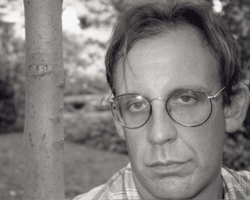Madison Smartt Bell in Haiti
I’ve spent every minute, day, week, fortnight I can beg, borrow, or steal in Haiti for the last three years. I went the first time because a film director had enticed me to go in preparation for a proposed project for which I was to write the screenplay, but then pulled out at the last minute when the book he wanted to option fell through (the author unfortunately was booked on the Oprah show and had dollar signs in his eyes). By then I had been studying my Pimsleur language tapes (woefully inadequate), my Edwidge Danticat stories (magic on paper), and my C.L.R. James (men in chains, severed heads on posts, quills dipped in skulls filled with the blood of white men), and it was love from afar. I had to go, so I started going, and I’ve been going ever since.
Most the time I’m in Ouest Province — Port-au-Prince, Petionville, Fermathe, Callebasse, Artiste, Barette. But this summer I traveled north for the first time, to Cap Haitien, near where King Henri Christophe hired an Italian architect to build him the most beautiful royal complex in the Western Hemisphere, bid him adieu, then sank the architect’s boat in the harbor with his cannons, so he would never be able to build anyone else anything like what he had built for Henri Christophe.
I’ve tried my best to experience Haiti as the Haiti I am experiencing, through the filter of my own experience and through the eyes of the friends I have made in Haiti, rather than on the terms set by books. But it was difficult to visit Cap Haitien and not be constantly in mind of its foremost American interpreter, Madison Smartt Bell, whose trilogy of the revolution set a standard for precision and exhaustiveness that the rest of our practitioners of historical fiction have yet to match, and whose uncollected essays on Haiti reflect a degree of insightfulness I doubt I’ll be able to achieve twenty or thirty or a hundred years from now unless I finally give in to an impulse my family considers dangerous and move to Haiti for good.
An excerpt from Bell’s “Miroir Danjere,” an essay about vaudou, a religious expression to which Bell has become an acolyte:
According to the vaudou beliefs in which the country has been saturated since the time of slavery, the ocean surrounding Haiti is a mirror, whose surface divides the world of the living from the world of the dead. The division is not absolute, however, for in vaudou as in the African religions from which it springs the dead do not depart, but remain present and available for communion with the living. It’s fortunate that no one really dies in Haiti, since it has always been a bloody place. READ MORE >

